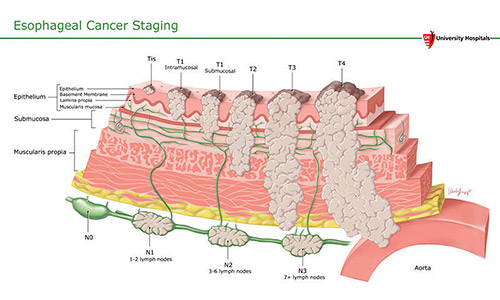Team Approach Provides Advanced Care for Esophageal Cancer
At University Hospitals (UH) Seidman Cancer Center, we are dedicated to providing comprehensive, advanced care to patients with esophageal cancer. With nationally recognized cancer expertise, we are one of only 49 National Cancer Institute-designated centers in the U.S. Our focus is always on excellence in clinical care and bringing innovations to our patients through research and clinical trials. Through this focus on discovery, our patients receive advanced diagnostics and the most recent esophageal cancer treatments.
Your health is important. Get expert care.
Offering in-person and virtual visits. Call today to see which option is right for you. 216-844-3951.
Find a DoctorEsophageal cancer patients are diagnosed and treated by our thoracic and esophageal cancer care team, which includes medical and radiation oncologists, thoracic surgeons, pulmonologists and gastroenterologists. This team works together to tailor esophageal cancer treatment plans to each patient's individual needs.
Understanding Types of Esophageal Cancer
Esophageal cancer develops within the lining of the esophagus, which is the muscular tube that carries food and liquids from your mouth to the stomach. There are two main types of esophageal cancer including:
- Adenocarcinoma: The most common type of esophageal cancer, adenocarcinoma begins in the cells that produce and release mucus and other fluids. It is typically found in the lower part of the esophagus.
- Squamous cell carcinoma: Almost always found in the upper part of the esophagus, squamous cell carcinoma begins in the flat skin-like cells that line it.
Esophageal Cancer Symptoms
Typical symptoms of esophageal cancer may include issues such as heartburn or swallowing problems, also called dysphagia. These symptoms can easily be mistaken for other common digestive problems. However, esophageal cancer can also cause a wide variety of symptoms that are related to other areas, so patients should talk to their healthcare provider if they are experiencing any of these symptoms, including:
- Back pain
- Chest pain
- Hoarse voice
- Persistent cough
- Unexplained weight loss
Seeing a specialist as soon as possible allows an earlier esophageal cancer diagnosis so treatment can begin at an earlier phase. Since symptoms can be easily confused with other conditions, often times, esophageal cancer is found in an advanced stage when it can be treated but rarely cured.
Diagnostics for Esophageal Cancer
Our team of cancer experts use a variety of advanced diagnostic techniques to precisely diagnose esophageal cancer, including:
Personalized Esophageal Cancer Treatment Plans
Our team of esophageal cancer specialists and surgeons will work with you to determine the best course of treatment based on your stage of cancer, size of the tumor and general health to help alleviate symptoms and treat the underlying condition. We may recommend one or a combination of the following treatments:
- Esophagectomy: An esophagectomy is an esophageal cancer surgery in which a portion of the esophagus is removed. A surgeon will connect the remaining healthy portion of the esophagus to the stomach, within the chest, so that you can swallow again. The thoracic surgery team at UH is highly specialized and experienced in performing esophagectomies, earning the highest score for patient outcomes from the Society of Thoracic Surgeons.
- Targeted radiation therapy: Targeted radiation treatment for esophageal cancer uses high-energy x-rays or other types of radiation to kill cancer cells or prevent them from growing.
- Chemotherapy: In chemotherapy, drugs are used to stop the growth of cancer cells by killing them or blocking them from dividing.
Research Excellence Leads to Innovations for Esophageal Cancer
Our team of esophageal cancer specialists offer a variety of clinical trials with the most innovative treatments for esophageal cancer. Some of these clinical trials include:
- Studying the use of positron emission tomography (PET) scan after chemotherapy to decide future treatment for esophageal cancer.
- The first in the country trial involving a brachytherapy stent which will deliver 3D computer planned radiation to the esophagus via an implanted stent.
- The use of an integrated PET-MRI scanner to more accurately stage esophageal cancers and assign patients to the most effective therapies.
- The use of proton therapy to reduce radiation injury to the heart and lungs.
- Studying new chemotherapeutic agents that are more effective at treating esophageal cancer.
Access to Educational Information and Support Groups
UH Seidman Cancer Center provides patients with esophageal cancer a supportive and nurturing environment to heal. As a patient, you will receive easy access to support groups and community education programs. You can also take advantage of:
- Art and music therapy
- Home care services
- Integrative oncology services
- Patient education
- Psychosocial counseling
- Social work services
- Spiritual care counseling
Schedule an Appointment
Your health is important. Get expert care.
Offering in-person and virtual visits.
Make an Appointment


